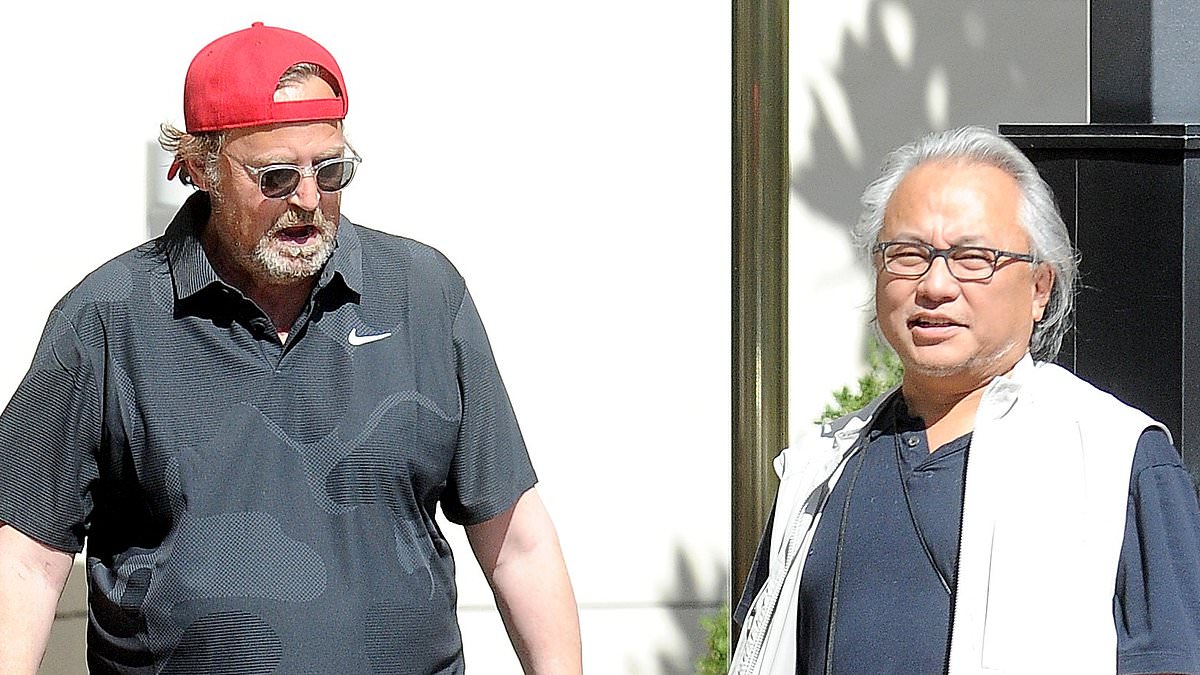Matthew Perry did not intend to die. What is clear, after reading the official documents from the criminal investigation which followed his death, is that he was, however, recklessly and habitually seeking narcotic oblivion when he eventually met his end.
The day he died, October 28, 2023, was meant to be just like the four days which had preceded it – a day spent being injected with the ‘dissociative’ drug ketamine, which is FDA-approved for the induction and maintenance of general anaesthesia during surgery.
Court documents reveal that on each of those days the much-loved Friends star ordered his live-in assistant, Kenny Iwamasa – known as ‘Alfred’ to Perry’s ‘Batman’ – to inject him with the drug six times a day.
Some days he even injected him eight times.
According to his statement to prosecutors, on the day his employer died, Iwamasa – who had no formal medical training – injected him at 8.30am, and then again at 12.45pm while Perry watched a movie. He was then asked to prepare Perry a hot tub before being commanded: ‘Shoot me up a big one.’
Iwamasa admits he did as he was told, when Perry was either near, or in, the hot tub at his Pacific Palisades mansion. He then went out on ‘errands’ for two-and-a-half hours.
On his return, he found his employer face-down and unresponsive in the water.

Matthew Perry with assistant Kenny Iwamasa, who injected him with drugs
The coroner found the actor, 54, died due to the ‘acute effects of ketamine’ with drowning a ‘contributory factor’.
Following his death, those who loved Perry have been clamouring for answers to a number of disturbing questions about his lifestyle and ultimate death.
However, as prosecutors seek justice against those in Perry’s circle who, they allege, played a part in his death, even more questions keep arising.
Chief among them: why was the actor left alone in his house to die? Would it have made a difference if his nursing team, who’d been on his payroll for years due to his addictions and health issues, had not been let go?
Why and who did let them go?
And, crucially, what if he had not been cared for solely by Kenny Iwamasa, whose previous work experience was as an executive assistant (essentially a secretary) to Perry’s agent Doug Chapin?
What if he’d been looked after by someone with experience of being a ‘sober companion’ – and by someone who had worked with drug addicts before?
Questions abound about Perry too, described by multiple sources as ‘manipulative’ and at times ‘angry and cruel’. To what extent was Iwamasa railroaded by his employer?
This complicated quandary was summed up by one friend, who said: ‘Don’t get me started on my opinion of Kenny and Kenny’s actions or decisions. There is a special place in hell for someone who is willing to stick a needle full of drugs into another human being who just published a book about sobriety.’ But the friend adds: ‘I’m by no means saying Matthew is a victim.’
Another source close to the actor points out that Perry had very few people around him late last year, and was very isolated.
Previously, he’d had two assistants plus a nursing team on hand to supervise the taking of prescribed medications and in case of medical emergencies.
At some point in 2023 Perry’s nursing care was discontinued. His friends and family don’t doubt that getting rid of the nurses was his decision. US Weekly magazine reports that he was ‘verbally, emotionally and physically abusive’ to at least one of them.
However sources point out that Perry’s taste for ketamine, which seemed to have taken over from a decades-long struggle with oxycontin, came with its own deadly consequences which any medical professional could have foreseen.

Questions abound about Perry too, described by multiple sources as ‘manipulative’ and at times ‘angry and cruel’
As is noted by the district court bringing the charges against his pushers: ‘Due to the medical risks associated with ketamine, it was widely accepted in the medical community that a health care professional was required to monitor a patient who had just been given ketamine.’
The court adds: ‘While monitoring a patient who had been administered ketamine, it was necessary for the health care professional to have access to certain lifesaving equipment, including a defibrillator, a supply of supplemental oxygen, equipment to monitor the patient’s heart rate and breathing, and medication to ensure patient safety.’
None of this was present for Perry at the time.
That this was a huge risk must have been evident. In his plea agreement with prosecutors – a deal struck between the prosecution and defence teams in which a defendant agrees to plead guilty to a lesser charge in exchange for a more lenient sentence – Iwamasa concedes that in the month leading up to Perry’s death he found him unconscious ‘at least twice’ due to his drug use.
The plea agreement even states: ‘Victim MP’s death was a natural and foreseeable consequence of the conspiracy based on, among other things, the frequency and amount of ketamine that defendant was administering to Victim MP, defendant’s observations of Victim MP’s adverse reactions to ketamine injections in October 2023, and the fact that defendant was administering ketamine injections to Victim MP with no medical training, or any access to medical equipment necessary to counteract an adverse reaction to ketamine.’
His death was no bolt from the blue, then, but a foreseeable consequence of a rampaging addiction. Now some are saying that Perry’s addiction must surely have been obvious from his financial records if nothing else.
Iwamasa concedes that he met alleged drug dealer Dr Salvador Plasencia seven times and handed over $55,000 in total in a 29 day period.
All his staff – indeed all expenses – were apparently approved and paid by Lisa Ferguson, his long-term business manager. Perry reportedly had a $120 million trust fund and Lisa looked after all of his financial outgoings.
Did Ferguson know? A pal tells me: ‘Lisa or Lisa’s office handled all of his finances. Everything, every bill, every credit card. So I would imagine there is someone that saw what was going out. We are not talking about an amount you remove from an ATM.’
It should of course be stressed that Lisa may not have known and there could be some other explanation.
Read More
EXCLUSIVE
Matthew Perry's father appears frail and downcast as he seen on what would've been his 55th birthday

Indeed, in a text message from early October 2023 reproduced as part of the indictment, Iwamasa tells Plasencia that he was struggling to get to the bank quickly and often enough to keep up with the funds Perry was spending.
Ferguson did not respond to requests for comment about Perry’s staff, and neither did publicists for his estate or foundation.
So what is the truth about his circle?
One assistant, Briana Brancato, quit in 2023 after seven years. While the previous year his live-in sober companion, Morgan Moses, had left his employ, too.
She had joined his team in 2018, from her previous job in a rehab clinic. She left after an angry confrontation when he shoved her onto a bed.
Iwamasa was hired not long afterwards. He faces up to 15 years in jail, reduced as he pleaded guilty to supplying the drugs which killed his employer.
San Diego physician, Dr Mark Chavez, has also pleaded guilty to one count of supply, as has drug ‘distributor’ Erik Fleming.
Dr Plasencia has pleaded not guilty to ten charges including conspiracy to distribute ketamine.
Alleged drug dealer, the so-called California Ketamine Queen Jasveen Sangha has pleaded not guilty to all charges of possession and distribution of ketamine.
As the charges and accusations continue to mount, and the truth about Perry’s nihilistic lifestyle is revealed, another, even more pressing question emerges: how did he last so long?
